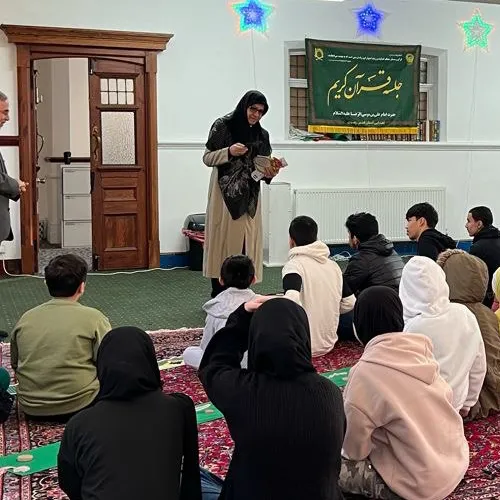Lady Khadijah al-Kubra
If the teacher’s lesson is a melody of love, even the most rebellious child will come to school on the weekends.”
One of the key features of the Friday Bulletin is its focus on the role of women in the cultural and social aspects of the community and family. Although the primary audience of this bulletin consists of Friday prayer leaders and congregational imams, the participation of women in Friday prayers and their role in strengthening this social institution cannot be overlooked. Women play a crucial role in maintaining the family unit, raising children, and introducing them to the teachings of the Ahl al-Bayt (peace be upon them).
On the occasion of the commemoration of the passing of Lady Khadijah al-Kubra (peace be upon her), we are once again hosting a woman dedicated to the service of the Qur’an and the Ahl al-Bayt (peace be upon them). Mrs. Soheila Amin is an active figure in the cultural and educational fields who has devoted many years to the education of children and young people in Qur’anic studies, religious teachings, and Persian language instruction. Her students, after completing their education and achieving high academic success, return with their spouses and children to pay tribute to this esteemed teacher.
Like many others, her academic background is in the field of experimental sciences, but in addition to her area of expertise, she has made significant contributions to the fields of humanities and religious studies.
Question 1. Mrs. Amin, could you tell us when and where you began your cultural activities? What is your area of specialisation?
I began my cultural activities in 2002 by teaching the Persian language. Initially, I started at the Ayatollah Khoei Institute and later continued at the Islamic Centre of England, where I currently manage the Dar al-Qur’an Tawhid.
In addition to teaching religious studies and the Qur’an, I also teach Persian at various levels. My academic specialisation is in pharmacy, and I have worked in the pharmaceutical industry for many years. At present, I am the CEO of a private clinical and care company. My passion for education and religious culture led me to dedicate most of my time and energy to teaching the Qur’an and Persian, alongside my professional career.
Question 2. What was the most distinctive trait of Lady Khadijah (peace be upon her), and how can we present this trait to the younger generation today?
The most significant characteristic of Lady Khadijah (peace be upon her) was her profound understanding of true values, in contrast to superficial and worldly illusions. Given her high social status, she was well aware of moral virtues and human excellence, both in pre-Islamic times and after the advent of Islam.
Lady Khadijah (peace be upon her) dedicated her wealth to supporting the Prophet (peace be upon him), standing by his side as a loyal spouse. Today, in an era where many people shape their lives around materialistic appearances, her example—resisting worldly temptations—serves as an ideal role model for any woman striving to attain a distinguished status.
Question 3. What role do home-based religious gatherings play in raising children in Western countries?
Home-based religious gatherings in Western countries, where access to cultural and educational opportunities related to the teachings of the Ahl al-Bayt (peace be upon them) is not always readily available, provide a valuable setting for promoting spiritual and moral values within families.
When discussions about the virtues of the Ahl al-Bayt (peace be upon them) take place in household gatherings, they naturally contribute to the religious and moral development of the family and, consequently, the children. Another significant aspect of home-based religious gatherings is their role in strengthening family bonds, as well as fostering unity with extended relatives and the broader community.
One of the major challenges faced by Muslim communities in the West is the generational gap between the younger and older generations. Although this issue exists globally, Muslim families in Western societies are particularly affected due to cultural influences, the rapid advancement of technology, and the prevalence of virtual interactions, which have increased emotional and intellectual distances. Religious gatherings—whether at home or in larger community spaces—can play a crucial role in strengthening family relationships and enhancing spiritual awareness.
Question 4. What is the greatest challenge faced by Muslim women in the West today, and how can they overcome it?
Muslim women in the West face numerous challenges, but based on my experience in educational management, I believe one of the most significant difficulties is raising children according to moral and ethical values.
Creating opportunities for meaningful interaction between children and their families is a challenging task because children today receive an education based on a different worldview in schools. One way to tackle this issue is by encouraging religious gatherings, study circles, and Qur’anic and religious education sessions. These initiatives provide a platform for families to impart religious and ethical values to their children. By participating in such activities, family members can develop a shared strategy to confront these challenges together.
Question 5. How can women be encouraged to participate more actively in Friday prayers in Europe?
In my view, women can play a more active role in organising and managing Friday prayers. For instance, they could hold discussion sessions before or after Friday prayers to share experiences, exchange views, and explore ways to engage families more effectively in Friday prayers.
They could also engage in consultations with experts on child-rearing and how to address contemporary challenges, which are topics of particular interest to women. By implementing such initiatives, Friday prayers could create an environment that encourages greater female participation.
Ultimately, whenever Friday prayers, Islamic centres, or mosques address the needs and concerns of their audience, people naturally become more eager to attend. As the saying goes, “If the teacher’s lesson is a melody of love, even the most rebellious child will come to school on the weekends.”
editor's pick
news via inbox
Subscribe to the newsletter.




